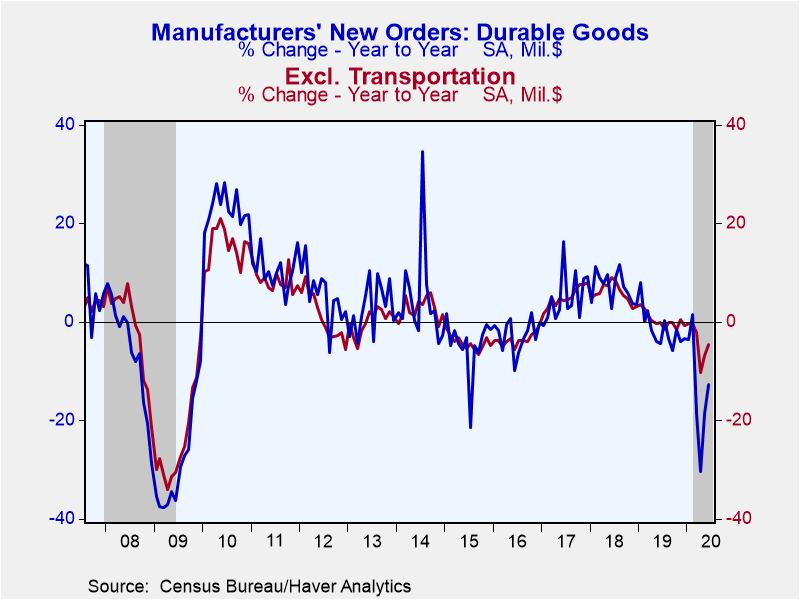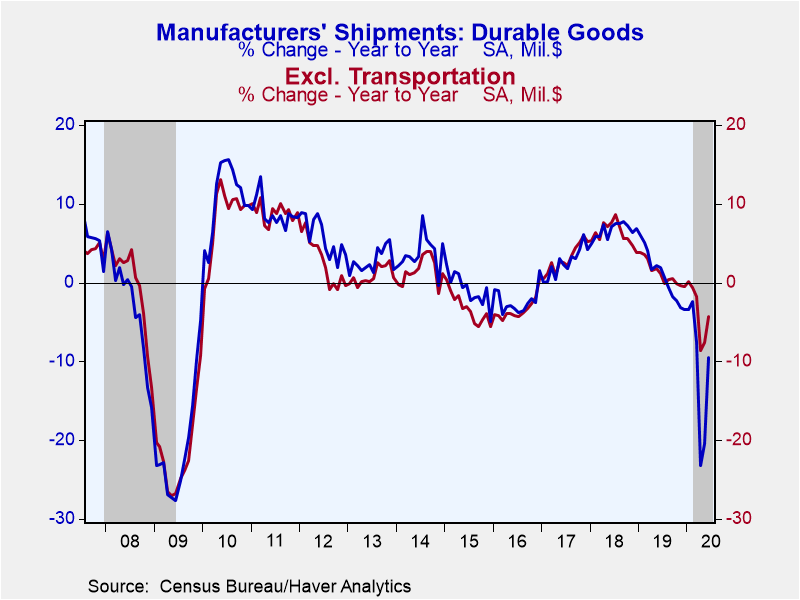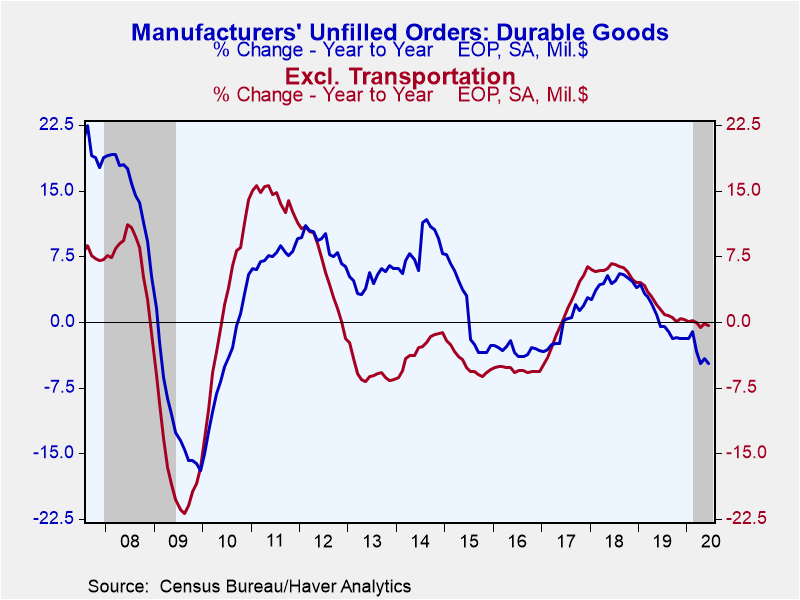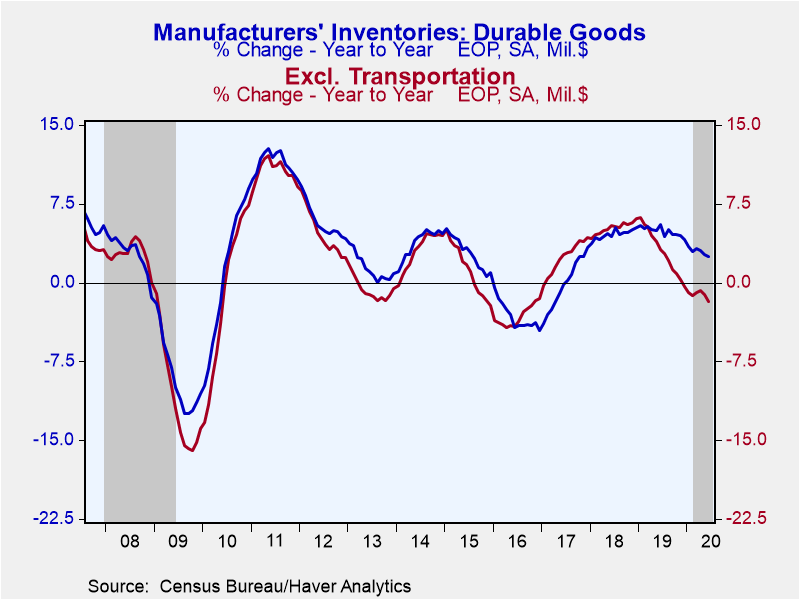 Global| Jul 27 2020
Global| Jul 27 2020U.S. Durable Goods Orders Surge Again in June
by:Tom Moeller
|in:Economy in Brief
Summary
• Durable goods orders jumped for the second straight month. • Stronger transportation orders added to the record May increase. • Capital goods bookings firm. The factory sector is on the mend following the coronavirus shutdowns. New [...]
• Durable goods orders jumped for the second straight month.
• Stronger transportation orders added to the record May increase.
• Capital goods bookings firm.
The factory sector is on the mend following the coronavirus shutdowns. New orders for durable goods jumped 7.3% during June (-12.7% y/y) following a 15.1% jump during May, revised from 15.8%. These increases followed two months of sharp decline. A 7.0% gain had been expected in the Action Economics Forecast survey. Transportation orders led the increase last month with a 20.0% rise, but they remained down 29.2% y/y. Motor vehicle & parts orders jumped 85.7% (-13.7% y/y) and offset cancellations of aircraft orders.
Order goods excluding transportation rose a steady 3.3% (-4.6% y/y), although the 3.6% May rise was revised down from 4.0%. These gains made up all but a small piece of the March/April shortfall. Nondefense capital goods orders excluding aircraft improved 3.3% (-3.2% y/y) and added to May's 1.6% rise. These increases failed to fully make up, however, April's 6.6% drop.
Elsewhere, increases in orders were broad-based. Fabricated metals orders strengthened 4.5% (-9.0% y/y) while primary metals orders rose 3.6% (-11.1% y/y). Machinery orders gained 2.7% (-8.1% y/y) after a 1.0% rise. These increases also did not recover the declines during the prior two months. Electrical machinery orders strengthened 1.2% (-7.9% y/y) after a 0.5% improvement, but did not recover April's substantial decline. Orders for computers & electronic products edged 0.1% higher (1.1% y/y).
Shipments of durable goods also were strong last month, posting a 14.9% jump (-9.5% y/y) after a 4.2% rise. The increase was led by a 51.9% rise (-19.3% y/y) in transportation shipments (mostly autos), while higher shipments of fabricated & primary metals added to the rise. Machinery shipments strengthened 3.1% (-8.6% y/y) after a 2.0% rise and electrical equipment shipments improved 2.0% (-6.5% y/y) following a 1.3% gain.
Nondefense capital goods shipments excluding aircraft strengthened 3.4% (-3.5% y/y) after moving up 1.6% in May. These gains failed to make up April's 6.4% decline.
Unfilled orders for durable goods declined 1.4% (-4.8% y/y), posting the third sharp decline in four months. Excluding the transportation sector, however, order backlogs held steady (-0.4% y/y) after declining in five of the prior six months.
Inventories of durable goods improved 0.1% (2.4% y/y) after two months of stability. Outside of the transportation sector, however, inventories were off 0.6% (-1.8% y/y) after falling 0.5%. Machinery & electrical equipment inventories recently have fallen sharply.
The durable goods figures are available in Haver's USECON database. The Action Economics consensus forecast figure is in the AS1REPNA database.
| Durable Goods NAICS Classification | Jun | May | Apr | Jun Y/Y % | 2019 | 2018 | 2017 |
|---|---|---|---|---|---|---|---|
| New Orders (SA, % chg) | 7.3 | 15.1 | -18.3 | -12.7 | -1.5 | 7.1 | 5.0 |
| Transportation | 20.0 | 78.9 | -48.9 | -29.2 | -4.8 | 9.2 | 4.7 |
| Total Excluding Transportation | 3.3 | 3.6 | -8.3 | -4.6 | 0.4 | 5.9 | 5.1 |
| Nondefense Capital Goods Excl. Aircraft | 3.3 | 1.6 | -6.6 | -3.2 | 1.7 | 4.6 | 4.1 |
| Shipments | 14.9 | 4.2 | -18.8 | -9.5 | 0.8 | 6.6 | 2.6 |
| Nondefense Capital Goods Excl. Aircraft | 3.4 | 1.6 | -6.4 | -3.5 | 2.4 | 5.7 | 1.1 |
| Unfilled Orders | -1.4 | 0.0 | -1.5 | -4.8 | -1.8 | 3.9 | 2.8 |
| Inventories | 0.1 | 0.0 | 0.0 | 2.4 | 4.1 | 5.2 | 3.4 |
Tom Moeller
AuthorMore in Author Profile »Prior to joining Haver Analytics in 2000, Mr. Moeller worked as the Economist at Chancellor Capital Management from 1985 to 1999. There, he developed comprehensive economic forecasts and interpreted economic data for equity and fixed income portfolio managers. Also at Chancellor, Mr. Moeller worked as an equity analyst and was responsible for researching and rating companies in the economically sensitive automobile and housing industries for investment in Chancellor’s equity portfolio. Prior to joining Chancellor, Mr. Moeller was an Economist at Citibank from 1979 to 1984. He also analyzed pricing behavior in the metals industry for the Council on Wage and Price Stability in Washington, D.C. In 1999, Mr. Moeller received the award for most accurate forecast from the Forecasters' Club of New York. From 1990 to 1992 he was President of the New York Association for Business Economists. Mr. Moeller earned an M.B.A. in Finance from Fordham University, where he graduated in 1987. He holds a Bachelor of Arts in Economics from George Washington University.
More Economy in Brief
 Global| Feb 05 2026
Global| Feb 05 2026Charts of the Week: Balanced Policy, Resilient Data and AI Narratives
by:Andrew Cates










